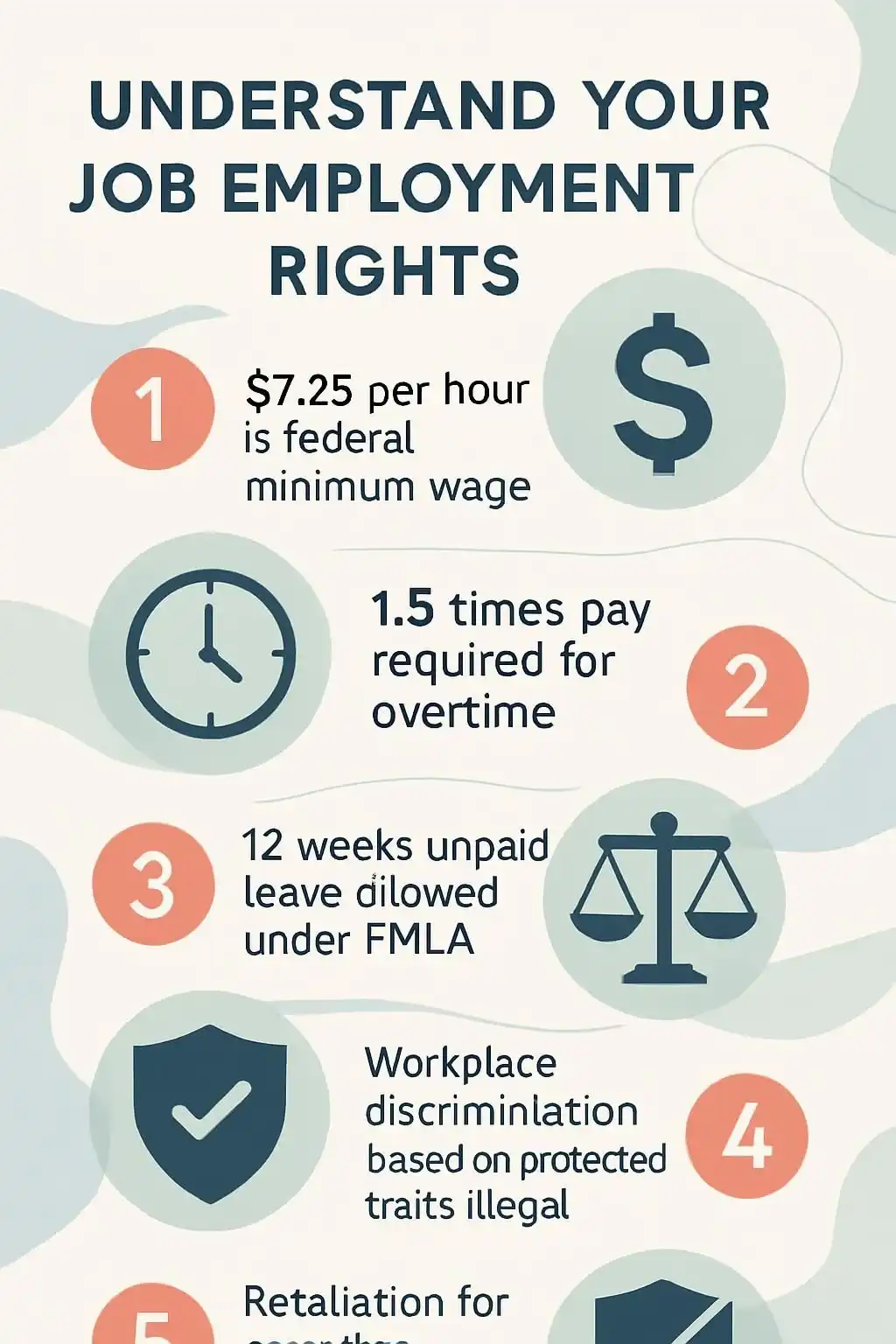Are you worried about your rights at work? Maybe you are not sure if your boss pays you fair wages or gives enough overtime pay. Some people face unsafe working conditions, wage theft, or even age discrimination and gender discrimination.
It can be scary to speak up against workplace issues like unpaid wages, sexual harassment, disability discrimination, unfair layoffs, or hostile work environments.
Here is one important fact: federal labor laws set clear rules for minimum wage standards and workplace safety through the Occupational Safety and Health Act. These laws also protect workers’ rights by the Fair Labor Standards Act (FLSA), Family and Medical Leave Act (FMLA), Equal Employment Opportunity Commission (EEOC), Americans with Disabilities Act (ADA), and more.
This blog will break down key areas of worker rights in simple steps. You will learn what protections you have under law such as fair pay rules, health benefits requirements, anti-discrimination guidelines for transgender status or race discrimination concerns plus basic vacation policies like paid sick time and parental leave options including maternity leave and paternity leave.
Ready to make sense of your employee rights? Keep reading for easy tips that help protect you at every job!
Key Takeaways
- The Fair Labor Standards Act (FLSA) sets the federal minimum wage at $7.25 per hour. Most workers must also get overtime pay—1.5 times their normal hourly rate—for hours worked over 40 each week.
- Federal laws like OSHA and FMLA protect your rights to a safe workplace and family leave. You can take up to 12 weeks of unpaid leave with job protection if you qualify under FMLA.
- Discrimination based on race, sex, age (over 40), disability, religion, or national origin is illegal at work under laws enforced by the Equal Employment Opportunity Commission (EEOC).
- If your rights are violated—such as unpaid wages, safety issues, or harassment—you should document everything and report it to your HR department or government agencies like OSHA or the EEOC.
- Retaliation for reporting problems is against the law. Your boss cannot fire you or reduce your hours for standing up for your employment rights.

Key Areas of Employment Rights

Employment laws protect you at work, setting standards for fair wages, safe conditions, and equal treatment. Agencies like the Equal Employment Opportunity Commission (EEOC) and Occupational Safety and Health Administration (OSHA) help you understand what your rights mean each day on the job.
What are my rights regarding fair pay and overtime?
Most workers have the right to receive at least the federal minimum wage for every hour worked. The Fair Labor Standards Act, also known as FLSA, sets this rule. Today, the federal minimum wage is $7.25 per hour.
States like California often have higher state minimum wages than what is set by the federal government. Employers must follow whichever rate is higher.
The law also says that employees should get overtime pay after working more than 40 hours in a single workweek. Overtime pay means receiving one and a half times your regular hourly rate for each extra hour worked beyond 40 hours per week.
If you earn $10 an hour, overtime should be $15 an hour for each extra hour worked over 40 hours in that week. Wage theft happens if a boss does not pay all earned money or deducts too much from your paycheck; sometimes they misclassify people as independent contractors instead of employees to avoid paying fair wages and overtime rates.
The Wage and Hour Division investigates unpaid wages, incorrect deductions, and worker misclassification.
How can I ensure my workplace is safe and healthy?
Keeping your workplace safe and healthy is very important. Start by understanding the Occupational Safety and Health Act (OSHA). This law ensures safe working conditions for all employees.
You have the right to report unsafe situations to OSHA without fear of retaliation. If you see hazards, speak up! Your safety is a priority.
Proper training is key too. Make sure you receive safety training before starting new tasks. Use appropriate protective equipment like gloves or helmets when needed. Employers must provide these resources for their workers’ rights.
They should maintain accurate records of work hours and wages as well, ensuring fair treatment under labor laws like the Fair Labor Standards Act (FLSA). Keeping a safe environment helps everyone stay healthy at work!
What protections do I have against discrimination and harassment?
Ensuring workplace safety is vital, but understanding your rights against discrimination and harassment is just as important. The law protects you from unfair treatment based on certain traits.
These include race, color, religion, sex, national origin, age (40+), disability, and genetic information. You cannot be harassed due to these characteristics.
If someone discriminates or harasses you at work, speak up. The law prohibits retaliation for reporting these actions. This means your employer cannot punish you for standing up against unfair treatment.
It’s essential to know that everyone deserves a fair chance at work—free from any form of hate or bias.
What should I do if my employment rights are violated?
If your employment rights are violated, it’s crucial to act quickly. You have options to protect yourself and seek justice.
- Document every incident. Write down the date, time, and details of what happened. This record can be very helpful later.
- Report your issue to Human Resources or a supervisor. Be clear about what violation occurred and how it affected you.
- Contact relevant agencies if necessary. Reach out to OSHA for workplace safety issues or the EEOC for discrimination cases.
- Seek legal counsel for serious violations. A lawyer can guide you through the process and help file any claims you may need.
- Know that retaliation is illegal. If you face backlash after reporting an issue, this could lead to further action against your employer.
- Consider filing a complaint with the Department of Labor if wage issues arise. They handle unpaid wages and unfair labor practices.
- Reach out to coworkers who may have witnessed incidents or faced similar issues; their support can strengthen your case.
- Explore whistleblower protections if applicable; you deserve protection when reporting illegal activities at work.
- Stay calm and collected throughout this process; maintaining professionalism is key as you pursue your rights.
- Continue working while taking these steps unless advised otherwise by a legal expert; prioritize your job stability whenever possible.
How does the law protect me from retaliation at work?
The law offers strong protection against retaliation at work. If you report discrimination or harassment, your employer cannot punish you for speaking up. This means they can’t fire you, cut your hours, or treat you unfairly because of your complaint.
The Occupational Safety and Health Administration (OSHA) allows workers to report unsafe conditions without fear of losing their job.
Laws like the Family and Medical Leave Act (FMLA) also protect employees who need time off for family issues. Employees can take 12 weeks of unpaid leave without risk if they qualify.
These laws ensure that worker rights are respected in a safe environment. Knowing these protections is key to standing up for yourself when needed. Next, let’s talk about what steps to take if your employment rights are violated.
Conclusion
Understanding your job employment rights is key for a safe and fair workplace. You learned about fair pay, safety measures, and protection against discrimination. These tips are easy to follow and can make a big difference in your work life.
Knowing your rights helps you stand up for yourself when needed. For more information, check out resources like the Equal Employment Opportunity Commission (EEOC) or local labor offices.
Take action today; be informed about your rights and advocate for yourself!
Explore your options and rights further by checking out the latest job listings now.
FAQs
1. What are my basic worker rights under labor laws?
You have the right to fair wages, safe working conditions, and protection against job discrimination based on race, gender, disability, age, or transgender status. Laws like the Fair Labor Standards Act set minimum wage and overtime pay rules.
2. How do workplace safety and health regulations protect me?
The Occupational Safety and Health Act requires employers to provide a safe workplace free from hazards. If you experience workplace injuries or unsafe conditions, you can report them to OSHA for investigation.
3. What should I know about overtime pay and unpaid wages?
If you work more than standard hours as defined by the Wage and Hour Division or state law, your employer must pay overtime rates. You also have the right to claim any unpaid wages through official channels if needed.
4. Can I get paid sick leave or family leave at my job?
Many workers qualify for paid sick leave under local rules or company policies; federal protections include the Family and Medical Leave Act which lets eligible employees take time off for medical reasons without losing their jobs.
5. What happens if I am laid off from an at-will employment position?
At-will employment means either party can end work anytime unless protected by an employment contract or specific labor code provisions like those in California law; laid-off workers may be eligible for unemployment insurance benefits depending on circumstances.
6. Who helps enforce employee rights regarding discrimination and harassment?
The Equal Employment Opportunity Commission investigates claims of sexual harassment in the workplace along with cases involving unwelcome sexual advances or other forms of job discrimination tied to race, disability, age, gender identity including transgender status; reasonable accommodations may be required by law too when applicable.










What do you think?
It is nice to know your opinion. Leave a comment.